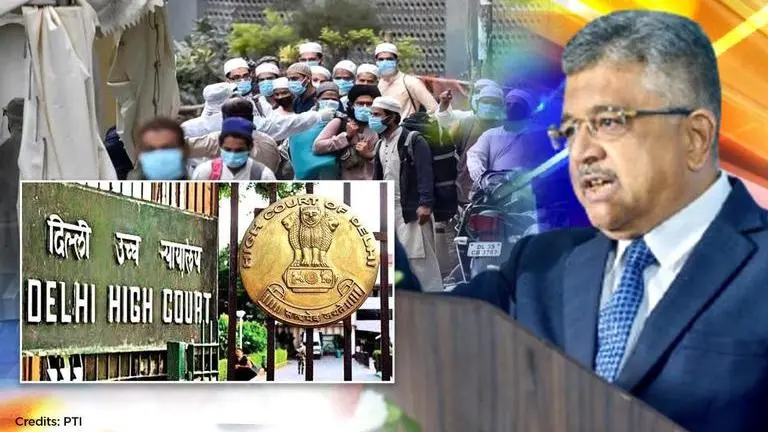Updated 15 April 2021 at 17:24 IST
Delhi HC allows 50 persons to offer Namaz at Nizamuddin Markaz amid COVID-19 crisis
The Delhi High Court allowed 50 persons to offer Namaz 5 times a day during Ramadan at the first floor of the Nizamuddin Markaz mosque in the national capital.
- India News
- 4 min read

In a key development on Thursday, the Delhi High Court permitted 50 persons to offer namaz 5 times a day during Ramadan on the first floor of the Nizamuddin Markaz mosque in the national capital. A single-judge bench of Justice Mukta Gupta was hearing a plea filed by the Delhi Waqf Board seeking permission for devotees to pray at this mosque which was closed since March 31, 2020, when it hosted a Tablighi Jamaat congregation. Earlier in the day, Delhi Police and Centre's counsel Rajat Nair stated that these restrictions are applicable across the board.
He stated, "The situation is becoming graver day by day as we argue before the court. Infection is at an all-time high in Delhi and therefore it would be not in the interest of anyone to press for a congregation of a religious nature at present time. Kalka temple is offering Darshan online. Sacred Heart Church is conducting online masses. The petitioner should also understand the unprecedented position of COVID and may choose to make only those submissions which make an even and refrain from making any submission which would create odds". He added that only 5 persons were allowed to offer prayers till now.
In a report filed by the Assistant Commissioner of Police Sub Division Lajpat Nagar, the Centre said that the HC "in its wisdom and discretion" may permit such persons as it deems fit and proper to perform namaz only on the ground floor of Nizamuddin Markaz by strictly following all COVID-19 related protocols. Without specifying whether all places of worship were closed, as was sought by the court, the affidavit said the DDMA notification prohibiting all kinds of gathering in the wake of increasing COVID-19 cases was applicable to all religions. On Tuesday, Solicitor General Tushar Mehta informed the court that all social/ political/ sports/ entertainment/ academic/ cultural/ religious/festival-related and other gatherings and congregations are prohibited as per the Delhi Disaster Management Authority order dated April 10.
However, Justice Gupta highlighted that religious places have not been shut as per the DDMA order dated April 10. At the same time, she clarified that this order will be subject to any notification with respect to religious places and gatherings. Moreover, the HC rejected the request of the Delhi Waqf Board to grant permission for 50 persons to offer prayers on the remaining two floors as well and directed the body to approach the competent authorities for the same. The matter was adjourned to July 16. This order comes on a day when CM Arvind Kejriwal announced a weekend lockdown after the city recorded over 17,000 COVID-19 cases in a single day.
Delhi High Court allows 50 people to offer prayers at Nizamuddin Markaz mosque five times a day, subject to guidelines issued by authorities concerned
— ANI (@ANI) April 15, 2021
The Markaz controversy
The controversy erupted when 24 people who had attended the religious congregation at Markaz Nizamuddin tested positive for COVID-19. Thousands of people who participated in the event travelled to various states in India, risking the spread of the novel coronavirus. According to the Ministry of Home Affairs, 1746 individuals including 216 foreigners were staying in the Markaz building as of March 21, 2020.
Advertisement
As per the Delhi government, the religious congregation violated the prevailing orders, which prohibited large gatherings. However, the Markaz claimed that it had not flouted the rules and discontinued the religious function after the announcement of the nationwide lockdown. Instead, it alleged that many of the attendees were stuck due to the unavailability of transport services.
On March 31, 2020, the Delhi Police registered a case against Maulana Saad and other officials of Tablighi Jamaat under sections of the Epidemic Disease Act,1897 and Section 269, 270, 271, and 120-B of the Indian Penal Code. In the FIR, it has been stated that the congregation failed to take safety measures for the prevention and treatment of COVID-19. As of April 3, 2020, 30% of the total COVID-19 cases in India were linked to the Tablighi Jamaat religious congregation.
Advertisement
Published By : Akhil Oka
Published On: 15 April 2021 at 17:00 IST
